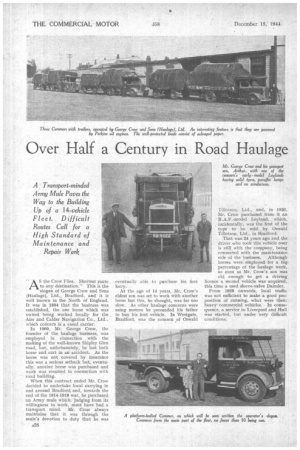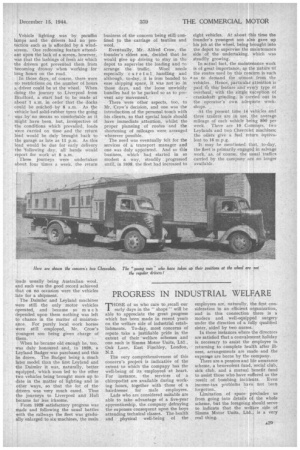Over Half a Century in Road Haulage
Page 30

Page 31

If you've noticed an error in this article please click here to report it so we can fix it.
"ASthe Crow Flies. Shortest route to any destination.— This is the slogan of George Crow and Sons (Haulage), Ltd., Bradford, and it is well known in the North of England. It was in 1894 that the business was established, the one horse which was owned being worked locally for the Aire and Calder Navigation Co., Ltd., which concern is a canal carrier.
In 1900, Mr. George Crow, the founder of the haulage business, was employed in connection with the making of the well-known Shipley Glen road, but, unfortunately, he lost both horse and cart in an accident. As the horse was not covered by insurance this was a serious setback hut, eventually, another horse was purchased and work was resumed in connection with road building.
When this contract ended Mr. Crow decided to undertake local carrying in and around Bradford and, towards the end of the 1914-1918 war, he purchased an Army mule which, judging from its willingness to work, must have had a transport mind. Mr. Crow always maintains that it was through the mule's devotion to duty that he was eventually able to purchase his first lorry.
At the age of 14 years, Mr. Crow's eldest son was set to work with another horse but this, he thought, was far too slow. As other haulage concerns were using motors he persuaded his father to buy his first vehicle. In Westgate, Bradford, was the concern of Oswald Tillotson, Ltd., and, in 1920, Mr. Crow purchased from it an R.A.F.-model Leyland, which, incidentally, was the first of the type to be sold by Oswald Tillotson, Ltd., in Bradford.
That was 24 years ago and the driver who took this vehicle over is still with the company, being connected with the maintenance side of the business. Although horses were employed for a bigpercentage of the haulage work, so soon as Mr. Crow's son was old enough to get a driving licence a second vehicle was acquired, this time a used sleeve-valve Daimler.
From 1920 onwards, local traffic was not sufficient to make a good proposition of running, what were then, heavy'commercial vehicles, In consequence, a service to Liverpool and Hull was started, hut under very difficult conditions. Vehicle lighting was by paraffin lamps and the drivers had no protection such as is afforded by a windscreen. One redeeming feature attendant upon the lack of a screen, however, was that the lashings of fresh air which the drivers got prevented them from becoming drowsy when working for long hours on the road.
In those days, of course, there were no restrictions on the number of hours a driver could be at the wheel. When doing the journey to Liverpool from Bradford, a start had to be made at about 1 a.m, in order that the docks could be reached by 8 a.m. As the vehicle had solid-rubber tyres the going was by no means so comfortable as it might have been, but, irrespective of the conditions which prevailed, loads were carried on time and the return load would be duly brought back to the garage as late as 11 p.m. As this load would be due for early delivery the 'following day, all hands would report for work at 8 a.m.
These journeys were undertaken about four times a week, the return loads usually being Australian wool, and such was the good record achieved that on no occasion were the vehicles late for a shipment.
The Daimler and Leyland machines were still the only motor vehicles operated, and because so much depended upon them nothing was left to chance in the matter of maintenance. For purely local work horses were still employed, Mr. Crow's youngest son being given charge of them.
When he became old enough he, too, was duly honoured and, in 1928, a Leyland Badger was purchased and this he drove. The Badger being a much later model than the first Leyland and the Daimler it was, naturally, better equipped, which soon led to the other two vehicles being brought more up to date in the matter of lighting and in other ways, so that the lot of the drivers was very much eased. Thus the journeys to Liverpool and Hull became far less irksome.
From 1928 satisfactory progress was made and following the usual battles with the railways the fleet was gradually enlarged to six machines, the main business of the concern being still confined to the carriage of textiles and wool.
Eventually, Mr. Alfred Crow, the founder's eldest son, decided that he would give up driving to stay in the depot to supervise the loading and to arrange the traffic. ‘Vool needs especially careful handling and although, to-day, it is iron banded to ease shipping space, it was not so in those days, and the loose unwieldy bundles had to be packed so as to prevent any movement.
There were other aspects, too, to Mr. Crow's decision, and one was the introduction of the personal touch with his clients, so that special loads should have immediate attention, whilst the proper planning of routes and the shortening of mileages were arranged wherever possible.
The need was eventually felt for the services of a transport manager and one was duly appointed. And so this business, which had started in so modest a way, steadily progressed until, in 1938, the fleet had increased to eight vehicles. At about this time the founder's youngest son also gave up his job at the wheel, being brought into the depot to supervise the maintenance side of the undertaking, which was steadily growing.
In actual fact, the maintenance work is of great importance, as the nature of the routes used by this concern is such • as to demand the utmost from the vehicles. Hence, particular attention is paid tb this feature and every type of overhaul, with the single exception of crankshaft grinding, is carried out in the operator's own adequate workshops.
At the present time 14 vehicles and three trailers are in use, the average mileage of each vehicle being 800 per week. There are 10 Commers, two Leylands and two Chevrolet machines; the oilers give a fuel return equivalent to 16 m.p.g.
It may be mentioned that, to-day, the fleet is primarily engaged in salvage work, as, of course, the usual traffics carried by the company are no longer available.




















































